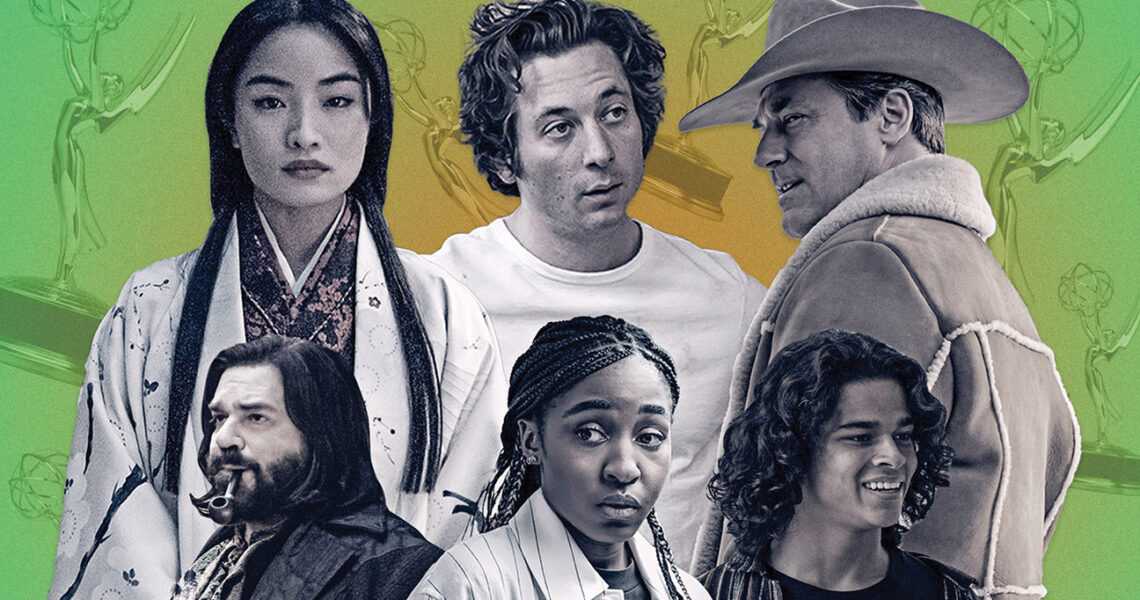FX Network’s Resurgence with “The Bear,” “Shogun,” and Emmy Nominations
FX, which stands for Fox Extended, was established by Fox in 1994. A basic cable channel described in its early years as “the little network of NASCAR and Fear Factor repeats,” it began to show the promise of being something more with the 2002 launch of its first original drama, The Shield, for which Michael Chiklis earned the first major Emmy nomination and win for a basic cabler that year. Two years later, John Landgraf, an exec at NBC during its “Must-See TV” epoch, was hired as FX’s head of original programming and began backing shows like Damages, Justified, Louie, The Americans and Atlanta, which made it basic cable’s premier network — the place for premium original programming for adult viewers — with a reach of 99 million households at its 2011 height.
Then, in 2019, as part of Disney’s acquisition of Fox, FX was absorbed into Bob Iger’s Mouse House, making it but one of a number of brands — others including ABC, Marvel and Lucasfilm — that the company possessed, the better to fuel its streaming services: Hulu, which came as part of the Fox deal, for adult-targeted fare; and Disney+ for family-friendly content.
Some worried that, in an era of hundreds of scripted shows that Landgraf himself, in 2015, had coined “Peak TV,” FX and its content might get lost, even just within the Disney family. Those fears were not allayed by the confusing decision to debut some FX shows on the linear channel and then, a few hours later, put them on Hulu, but to have other FX shows, like Mrs. America, skip linear altogether and go straight to Hulu, branded as “FX on Hulu” (bait to get more people to sign up for Hulu), all while Hulu was putting out its own originals, too. Nor were those concerns belied by FX’s Emmys trajectory, a key metric by which TV success is measured. FX had landed a personal-best 56 nominations in 2016, the year of The People v. O.J. Simpson: American Crime Story, but post-Disney acquisition, its tally dropped to 27 in 2019, 33 in 2020, 16 in 2021, 23 in 2022 and 37 in 2023.
Then came the announcement on July 17 of the nominations for the 76th Emmys.
FX exceeded all expectations by racking up 93 nominations — behind only Netflix’s 107, and two ahead of HBO, which last finished as low as third in 1996 — propelled by a field-leading 25 noms for the drama Shogun, and a comedy-record 23 nominations for The Bear. Most impressive was its batting average: It submitted only 17 shows, and its noms were spread across just nine, far fewer than its competitors. (Its other noms came from Reservation Dogs and What We Do in the Shadows, which both unexpectedly landed best comedy slots; the latest incarnations of its anthology series Fargo, Feud and American Horror Story; the reality series Welcome to Wrexham; and the animated series Archer.)
“I was just stunned, to be honest with you, by how broad-based the recognition was,” Landgraf tells THR. “I would’ve been perfectly happy with 57 nominations, thrilled if we’d gotten into the 60s, elated if we’d gotten into the 70s and dancing a jig if we’d gotten into the 80s.” But finding himself in the 90s, the unofficial “mayor of TV,” famous for his discourses at the annual TCA winter press tour, is mostly feeling grateful — to his creative partners for making such excellent shows, and to his corporate parent, the divisions of which collectively snagged 183 nominations.
“If we had not been bought by Disney, I think the number of Emmy nominations our artists received on [July 17] would have been zero, or much closer to zero than 93,” Landgraf declares, recognizing that other basic cablers like AMC, Comedy Central and IFC — which were major Emmys players a decade ago when Netflix was the only streaming platform making a dent — are now almost entirely absent from the field thanks to both the surge of cord-cutters and the proliferation of other streamers.
He continues: “Without Hulu, we certainly wouldn’t have been able to make something like Shogun. You can’t make that for an American linear television channel in the way that it was made for a broadcast network in 1980. You can only make it for a global streaming service … to justify the level of spend on production and marketing that you need. [FX has since ordered a second season of the show.] And The Bear is an example of a show that’s been on FX in its second window, but its primary first window is and has always been on Hulu. And I’m just going to have a guess that the vast majority of the voters this year saw our programming on Hulu.
Landgraf’s conclusion: “For me, what FX was able to achieve this year was, in some ways, a proof of concept of the way that Disney and Iger structured the company, why he bought Fox and why he hasn’t melded everything into one single brand in one single studio and one single marketing organization.”
This story first appeared in the July 31 issue of The Hollywood Reporter magazine. Click here to subscribe.

